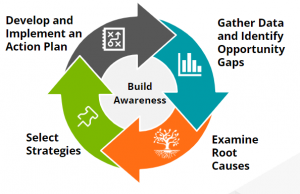In 2020, Advance CTE developed and piloted a virtual workshop to help Career Technical Education (CTE) leaders at the state and local level identify and address access and equity gaps using data. This initiative supports the realization of Principle 2 of the CTE Without Limits vision where each learner feels welcome in, is supported by and has the means to succeed in the career preparation ecosystem.
 The workshop includes five major components that build upon the requirements — as well as opportunities — laid out in the Strengthening Career and Technical Education for the 21st Century Act (Perkins V) to help state and local leaders operationalize the commitments set in their state plans:
The workshop includes five major components that build upon the requirements — as well as opportunities — laid out in the Strengthening Career and Technical Education for the 21st Century Act (Perkins V) to help state and local leaders operationalize the commitments set in their state plans:
- Raising awareness,
- Data analysis
- Root cause analysis
- Identification of practical strategies, and
- Action planning.
The first workshop cohort of 10 states launched September 2021 after successful pilots were conducted in New Jersey, Florida and Minnesota the previous year. Initially a one-day, five-hour training, the workshop now provides two four-hour training sessions on the materials created for state CTE leaders to in turn train their staff, regional coordinators and local education agencies. Participant receive the following materials:
- Facilitator Guide – Virtual or in-person instructions.
- PowerPoint Deck Template – Customizable slide deck for participant use.
- Participant Workbook – Activities and additional step-by-step instructions.
- Opportunity Gap Analysis Dashboard Template – Fillable pre-formatted Excel spreadsheet with graphs, a heat map, and instructions on data entry and comparison groups.
- Practical Strategies Resource – Warehouse of evidence based strategies to align to identified root causes.
- Action Planning Template – Facilitation tool to encourage stakeholders connection and collaboration.
Upon completion of the workshop, participants are required to plan and deliver the workshops in their states; evaluate the effectiveness of the workshop using a provided survey for their in-state participants to share with Advance CTE; and complete a six-month and 12-month survey to report any changes in CTE policies and procedures.
Workshop Benefits and Outcomes
Collaborative Spaces and Technical Assistance: The effects of the coronavirus pandemic on the education system has led to a reduced capacity of state CTE teams, which prompted Advance CTE to increase the intensity of technical assistance provided to states. Advance CTE staff launched a series of monthly community of practice calls to connect states with common challenges and to workshop solutions. To provide states with more time to plan and deliver their own in-state trainings, the cohort’s timeline was extended from three to six months.
Diversity, Equity and Inclusion: The workshop provides participants with foundational knowledge of equity prior to delving into data analysis. For example, the first objective — raising awareness — consists of developing an equity baseline for participants by reviewing the definitions for diversity, equity and inclusion; examining equity vs equality; and addressing the concept of deficit based thinking in comparison to strength based analysis. The workshop format allows for participant processing time on equity concepts, gives time for states to fully meet all five objectives, and allows the incorporation of another Advance CTE resource, Brave Dialogues: A Guide to Discussing Racial Equity in Career Technical Education.
Data Analysis Training and Dashboard Development: Mock data (from the fictitious Heartland Public Schools and Heartland Community College) is used to mitigate the often difficult conversations associated with participants reviewing their data and keeps the focus on workshop training concepts and applications. The workshop facilitators intentionally meet states where they are in their data journey. Some states have data disaggregated by student sub-groups, but may not have data elements available for programs of study level analysis. The fillable Excel spreadsheet provided to participants is customizable and allows for Career Cluster level analysis. The identification of an opportunity gap narrows the scope of the analysis; however, a statewide, regional, institutional, school district, or campus analysis is possible using the dashboard template. An additional work-based learning (WBL) dashboard was developed upon request and is available for states to examine equitable access to and completion of industry-recognized certifications.
Analysis and Action Planning: For data to be an effective storytelling tool, participants have to recognize and be willing to interpret a point gap analysis through an equity-minded lens using data disaggregated by race, gender and ethnicity as well as the special population categories identified in Perkins V.
Providing workshop participants with a list of practical strategies, which are then selected based on a root cause analysis, increased the availability of resources states could offer local education agencies due to in-state dissemination of workshop materials. The accompanying action planning template and design allows state and local leaders to engage stakeholders with a structured process for developing solutions to gaps in access to high-quality CTE programming for marginalized learners.
Next Steps
The launch of cohort two in June of 2022 offered an opportunity to overlap communities of practice and allowed cohort two participating states to collaborate with states from the inaugural cohort. Currently Advance CTE is accepting applications for cohort three of the initiative and anticipates actively overlapping cohorts two and three into collaborative communities of practice. The cohort three application closes September 2, 2022.

